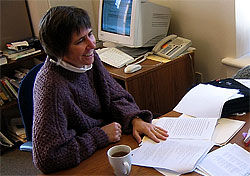Lisa Heldke
Professor of Philosophy

I am still interested in the questions that kept me awake nights when I first began studying philosophy as an undergraduate; questions about the nature of knowing, about certainty and truth, and about reality. I explore these with students in my courses in Modern Philosophy and American Philosophy. (Does that tree falling alone in the forest make a sound or not?) I’ve written about them in such articles as “Objectivity as Responsibility” and “Interaction in a World of Chance.”
I am also compelled by questions about the nature of justice, about oppression and resistance, and about human liberation, particularly as they concern racism, sexism and heterosexism. I explore these questions with students in the courses Feminist Philosophy and Racism and Sexism. With Peg O’Connor, I coedited the anthology I use in the latter course; it’s called Oppression, Privilege and Resistance. Articles I’ve published in this area include “In Praise of Unreliability,” and “Dear Kate Bornstein.”
My interests in questions of justice and questions of knowing come together, in a way, in my introductory course called School and Society. Here, we explore what it means to use education as a tool for creating and advancing democratic community. My articles “How Practical is John Dewey?” and “A DuBoisean Proposal for Persistently White Colleges” represent my own philosophizing in this area.
Finally, and perhaps most significantly, I am committed to exploring the philosophical significance of food—a topic about which philosophers historically have had very little to say. I’ve published numerous articles, as well as a book, Exotic Appetites: Ruminations of a Food Adventurer. I’ve also coedited two books in this area: Cooking, Eating, Thinking: Transformative Philosophies of Food was coedited with Deane Curtin; The Atkins Diet and Philosophy is part of a series of books that explores popular culture using philosophy.
I’m currently working on a few different projects:
- an examination of the dichotomy between cosmopolitanism, on the one hand, and localism on the other, using the lens of “local food” as my focusing device;
- the development of a notion of “radical listening,” as a tool for making social change; and
- an exploration of the question of how this liberal arts college can use food as a vehicle with which to realize its mission statement.